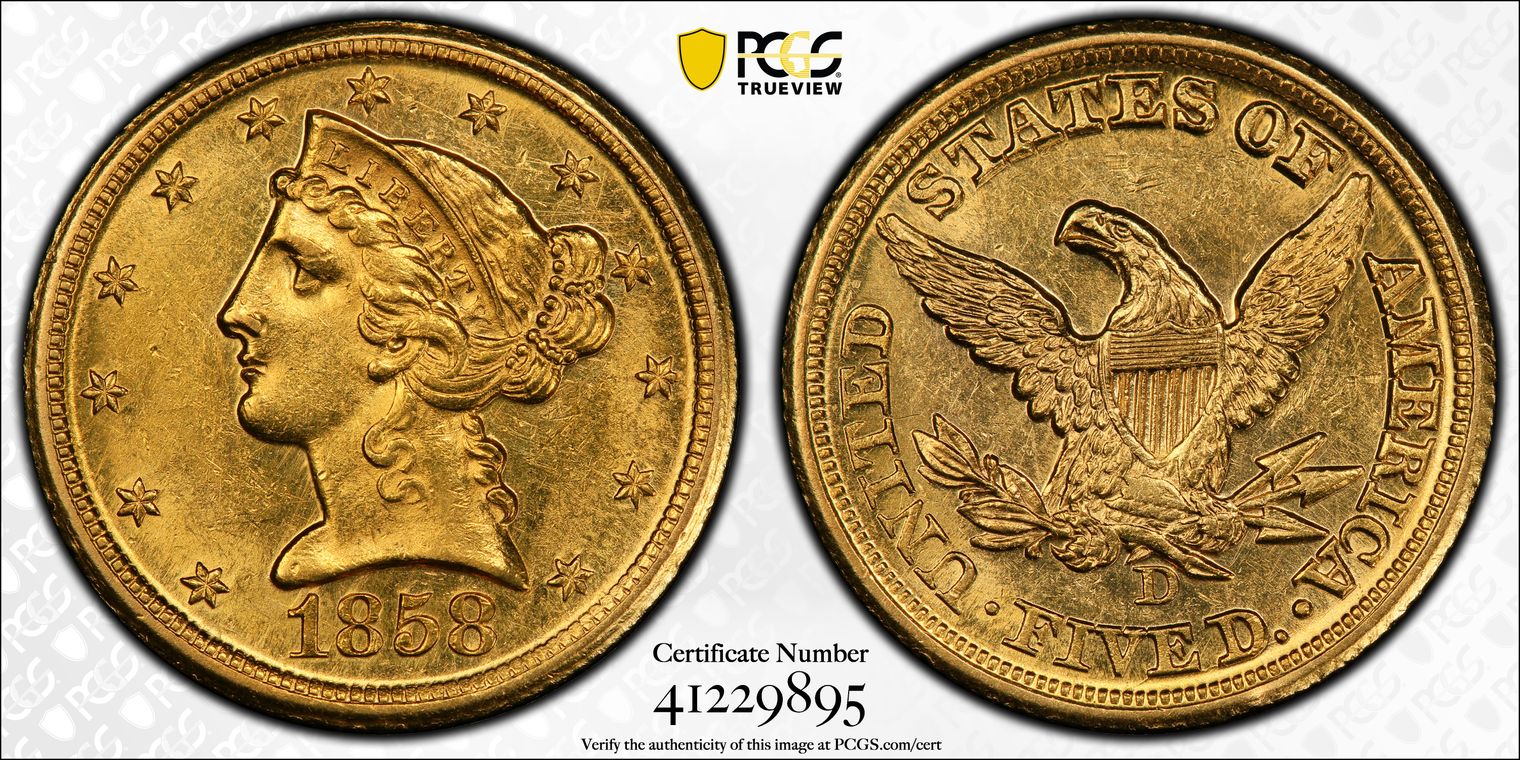1858-D $5 MS62+ 认证号41229895, PCGS号8278
专家评论
Doug Winter
Despite having a lower mintage, the 1858-D half eagle is a bit less rare overall than the 1857-D. In higher grades, the 1858-D is considerably more available.The 1858-D half eagle is usually seen in Extremely Fine grades. It is scarce in properly graded About Uncirculated-50 and it becomes rare in About Uncirculated-55. In Mint State, this is an extremely rare issue.
STRIKE: Nearly every known example is softly struck at the centers. On the obverse, the curls around the face are weak. The stars at the left are often sharper than the stars at the right. The reverse is weak on the upper part of the eagle’s legs and on the arrow feathers and claws. Both sides have slightly weak but fully defined denticles. The rims are rounded with a beveled appearance. A few are known (such as Byron Reed: 135) which are struck very slightly off center.
SURFACES: The 1858-D half eagle is difficult to locate with clean surfaces. Even higher grade examples show numerous abrasions. The fields are sometimes rough or slightly granular due to poorly prepared planchets.
LUSTER: Most higher grade specimens have good luster which is frosty in its texture. An extremely interesting example of this date, now in the Duke’s Creek collection, is almost fully prooflike with a degree of natural reflectivity unseen on any other Dahlonega gold coin regardless of date or denomination. This coin is so different from the typical 1858-D half eagle that one has to wonder if it is a specimen striking of some sort.
COLORATION: Original, uncleaned pieces often show very appealing rich orange-gold color. The colors are often very different from the other Dahlonega half eagles of this era. Most 1858-D half eagles have been cleaned or dipped at one time.
EYE APPEAL: Many do not show good eye appeal because of soft strikes. In addition, a large number of 1858-D half eagles have been cleaned. There are some extremely choice pieces known and most are in tightly-held collections.
PERSONAL OBSERVATIONS: The 1858-D is probably the most difficult of the late date half eagles from this mint to locate in very high grades. There are a few superb pieces known (including two in the Duke’s Creek collection) but most of the coins graded Mint State-60 to Mint State-62 have poor color and were regarded as About Uncirculated during the era of tougher grading.
DIE VARIETIES: Two die varieties are known to exist.
Variety 35-CC: Medium Mintmark. On the obverse, the 1 in the date is closer to the truncation than it is to the denticles. The reverse was first used in 1857 and it is as described for Variety 34-CC.
Variety 35-DD: Large Mintmark. The obverse is the same as listed above. The reverse was also used in 1859. The upright of the mintmark is over the gap between the V and the E in FIVE. The left edge of the mintmark is over the center of the right diagonal of the V while the right edge is over the right edge of the middle segment of the E. The mintmark is not close to the feather or the stem.
The discovery coin appears to have been Lot 474 in the November 2000 Bass Sale. Harry Bass first noted this variety sometime in the late 1960’s or early 1970’s.
David Akers (1975/88)
The 1858-D is usually softly struck on the hair curls around the face and on parts of the eagle. Stars are often flat and the rims are always well rounded to the point of being "beveled". The date is very rare in any condition and is particularly elusive in grades above EF. I have seen a couple of uncirculated examples and a few AU's but, once again, VF and EF are the typically available grades.
PCGS #
8278
设计师
Christian Gobrecht
边缘
Reeded
直径
21.65 毫米
重量
8.36 克
铸币数量
15362
金属成分
90% Gold, 10% Copper
更高评级数量
2
评级较低的钱币数量
145
地区
The United States of America
价格指南
PCGS 数量报告
拍卖 - PCGS 评级的
拍卖 - NGC 评级的
稀有性和存量估计 了解更多
| 所有评级 | 165 |
| 60或以上 | 10 |
| 65或以上 | 0 |
| 所有评级 | R-7.3 |
| 60或以上 | R-9.5 |
| 65或以上 | R-10.1 |
| 所有评级 | 53 / 112 TIE |
| 60或以上 | 59 / 112 TIE |
| 65或以上 | 1 / 112 |
| 所有评级 | 85 / 218 TIE |
| 60或以上 | 87 / 218 TIE |
| 65或以上 | 1 / 218 |
状况普查 了解更多
| #1 MS64 PCGS grade |
| #1 MS64 estimated grade |
| #3 MS63 PCGS grade |
| #4 MS62 PCGS grade |
| #4 MS62 PCGS grade |




















